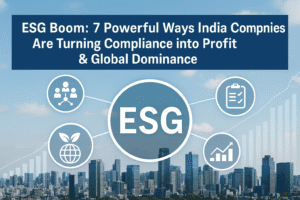ESG Boom: 7 Powerful Ways Indian Companies Are Turning Compliance into Profit & Global Dominance
Indian firms are strategically embedding ESG principles to drive growth, not just meet compliance. Regulatory shifts like SEBI’s mandatory disclosures and RBI’s green lending rules have accelerated ESG integration beyond aspiration. Forward-thinking companies now leverage ESG to attract global capital (evident in surging ESG fund inflows), build consumer trust among values-driven youth, and retain talent in a competitive market. Crucially, robust ESG frameworks mitigate supply chain risks and enhance operational resilience against climate disruptions.
While reporting progress is visible, leaders focus on material action—linking executive pay to ESG goals, redesigning processes, and embedding sustainability into core strategy. For India’s massive economy, ESG is no longer ethical window-dressing but a non-negotiable engine for enduring, future-proof growth.

ESG Boom: 7 Powerful Ways Indian Companies Are Turning Compliance into Profit & Global Dominance
The narrative around ESG in India is undergoing a profound shift. Gone are the days when sustainability was a peripheral CSR activity or a mere reporting obligation. Today, forward-thinking Indian firms are strategically embedding Environmental, Social, and Governance (ESG) principles into their core DNA, recognizing it not just as ethical necessity, but as the critical engine for resilience, competitiveness, and long-term growth in a volatile world.
From Aspiration to Institutional Mandate: The Regulatory Catalyst
India’s journey has been accelerated by decisive regulatory action:
- SEBI’s BRSR Revolution: The mandate for the top 1,000 listed companies to file detailed Business Responsibility and Sustainability Reports (BRSR) fundamentally changed the game. This isn’t just about transparency; it’s a powerful lever forcing ESG integration into mainstream corporate strategy and accountability. The rapid compliance – over 1,170 filings by mid-2024 – signals a seismic shift in corporate priorities.
- RBI’s Green Push: The Green Deposit Guidelines are reshaping banking. Lenders are now compelled to rigorously assess environmental risks within their credit frameworks, subtly but powerfully redirecting capital towards sustainable ventures.
- National Framework: The Ministry of Corporate Affairs’ National Guidelines on Responsible Business Conduct (NGRBC) provides a cohesive framework, aligning corporate actions with ESG principles and the UN Sustainable Development Goals (SDGs), moving beyond fragmented efforts towards coordinated national progress.
Leveraging ESG for Tangible Business Advantage
Indian companies are moving far beyond compliance checkboxes, actively harnessing ESG for strategic growth:
- Unlocking Global Capital & Market Access: The explosive growth of ESG funds globally (projected to exceed $50 trillion AUM by 2025) is undeniable. Indian firms with robust ESG credentials are increasingly attractive to this massive capital pool. Recognition on prestigious indices like the Dow Jones Sustainability Index (achieved by ~20 Indian firms) opens doors to international investors and markets demanding sustainable partners.
- Building Irreplaceable Brand Value & Consumer Loyalty: In an oversaturated market, authenticity matters. Consumers, especially younger, digitally-native generations, actively seek brands aligned with their values. Products and services demonstrably rooted in sustainable principles foster deeper loyalty and command premium positioning. ESG is becoming a core differentiator.
- Attracting and Retaining Top Talent: For Gen Z and millennials, values alignment is non-negotiable. Studies consistently show a significant majority (like the 64% LinkedIn finding) refuse to work for companies misaligned with their ethics. A genuine ESG commitment is now a critical weapon in the war for skilled talent.
- Fortifying Resilience & Mitigating Costly Risks: Climate change isn’t abstract; it’s a direct threat to supply chains and operations (costing suppliers $120 billion globally in 2022). Proactive ESG integration – assessing environmental risks, ensuring ethical sourcing, building strong community relations – creates operational shock absorbers. It prepares businesses for regulatory shifts, physical disruptions, and reputational crises before they strike.
- Driving Efficiency and Long-Term Value: Research (like the McKinsey report cited) consistently links strong ESG performance with reduced cost of capital and superior long-term financial performance. Resource efficiency, waste reduction (embracing circular models), and strong governance aren’t just “green” – they’re fundamentally good for the bottom line.
The Challenge: Moving from Report to Reality
The progress is undeniable, but the path demands more than disclosures:
- Materiality is Key: Companies must move beyond generic reporting. Identifying the most significant ESG risks and opportunities specific to their industry, operations, and stakeholders is crucial. What truly impacts long-term value? What do investors and customers genuinely care about? Focusing efforts here is vital.
- Action Over Narrative: Stakeholders demand evidence, not just eloquent sustainability reports. Concrete actions – re-engineering supply chains, measurable emission reductions, demonstrable social impact, linking executive compensation to ESG targets – build credibility.
- Strategic Integration: Truly future-proofing requires ESG to be woven into the core business strategy, overseen at the board level (evidenced by the rise of Chief Sustainability Officers), and reflected in investment decisions and product development, not siloed in a separate department.
The Indian Opportunity: Leading the Sustainable Future
India stands at a unique inflection point: the world’s fourth-largest economy, powered by its youthful population, operating in a highly climate-vulnerable region. This convergence makes India’s ESG journey globally significant. The regulatory foundations are laid. The business case is clear. The momentum is building.
Leading Indian companies understand that sustainable growth isn’t a constraint; it’s the only viable path forward. They are moving beyond seeing ESG as a cost or compliance burden, recognizing it instead as the essential toolkit for building resilient, valuable, and purpose-driven enterprises ready to thrive in the 21st century. The transformation from “business as usual” to “business as a force for good” is not just ethical; it’s the ultimate strategy for enduring success in India and on the global stage. The future belongs to those who embed sustainability into their very core today.
You must be logged in to post a comment.